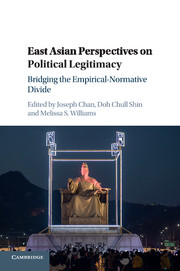Book contents
- Frontmatter
- Contents
- List of Contributors
- Preface and Acknowledgments
- 1 Political Legitimacy in East Asia: Bridging Normative and Empirical Analysis
- 2 Reasons to Obey: “Multiple Modernities” and Constructions of Political Legitimacy
- 3 Do East Asian States Enjoy a Legitimacy Premium?
- 4 Political Legitimacy in China: A Confucian Approach
- 5 Political Legitimacy in Hong Kong: A Hybrid Notion
- 6 The Evolution of Political Legitimacy in Singapore: Electoral Institutions, Governmental Performance, Moral Authority, and Meritocracy
- 7 Polarized Politics, Government Legitimacy, and Democratic Legitimacy in Taiwan
- 8 The Legitimacy of Democratic Rule in Korea: From the Perspective of the Mass Citizenry
- 9 Political Legitimacy, Satisfaction, and Japanese Democracy
- 10 Legitimacy as a Hybrid Phenomenon
- Index
5 - Political Legitimacy in Hong Kong: A Hybrid Notion
Published online by Cambridge University Press: 30 December 2016
- Frontmatter
- Contents
- List of Contributors
- Preface and Acknowledgments
- 1 Political Legitimacy in East Asia: Bridging Normative and Empirical Analysis
- 2 Reasons to Obey: “Multiple Modernities” and Constructions of Political Legitimacy
- 3 Do East Asian States Enjoy a Legitimacy Premium?
- 4 Political Legitimacy in China: A Confucian Approach
- 5 Political Legitimacy in Hong Kong: A Hybrid Notion
- 6 The Evolution of Political Legitimacy in Singapore: Electoral Institutions, Governmental Performance, Moral Authority, and Meritocracy
- 7 Polarized Politics, Government Legitimacy, and Democratic Legitimacy in Taiwan
- 8 The Legitimacy of Democratic Rule in Korea: From the Perspective of the Mass Citizenry
- 9 Political Legitimacy, Satisfaction, and Japanese Democracy
- 10 Legitimacy as a Hybrid Phenomenon
- Index
Summary
INTRODUCTION
Since the political handover in 1997, the government of the Hong Kong Special Administrative Region (HKSAR) has encountered repeated challenges to its governance and political legitimacy. Previous studies on the question of political legitimacy in Hong Kong found that the colonial government rested its legitimacy mainly on performance foundations, which were narrowly defined as maintaining good order, economic prosperity, and administrative efficiency. These studies further observed that not until the 1990s were such performance legitimacy foundations broadened to include maintaining the rule of law, the delivery of effective public policies, the protection of basic civic liberties, and the provision of social services and welfare.
This chapter nevertheless argues that before and after the 1990s, popular conceptions of political legitimacy in Hong Kong have always been mixed and beyond the narrowly defined performance foundations. In fact, recent developments in Hong Kong, most notably, the renowned “Umbrella Movement” in the fall of 2014, which had involved tens of thousands of young pro-democracy protestors, and other previous public actions, such as the Anti-National Education Protest in 2012, the siege at the Legislative Council building protesting the Guangzhou–Shenzhen–Hong Kong Express Rail in 2010, and the July 1 rally of half a million people against the national security bill in 2003, have provided further counter evidence against these early analyses. Despite Hong Kong's economic stability and growth over the decades, except for the few years during the Asian financial crisis, these social movements, especially those organized by the younger generations, have prompted further reflection on the definition of a legitimate government for the citizens of Hong Kong. This is an understanding that goes beyond performance standards and includes universal values such as a democratic government, equality, and policy fairness.
This chapter, based on survey results and the case of Anti-Express Rail Protest in 2010, aims to unravel the popular conceptions of political legitimacy in Hong Kong with a specific focus on the meanings of a legitimate government. In doing so, it argues against the once prevalent belief that the people of Hong Kong had endorsed a narrow concept of performance legitimacy. While it may be true that the idea of performance legitimacy prevailed during colonial times, other elements of political legitimacy also existed. Popular conceptions of political legitimacy in Hong Kong, as argued in this chapter, have instead been a hybrid, consisting of multiple and inconsistent standards.
- Type
- Chapter
- Information
- East Asian Perspectives on Political LegitimacyBridging the Empirical-Normative Divide, pp. 107 - 134Publisher: Cambridge University PressPrint publication year: 2016
- 4
- Cited by

